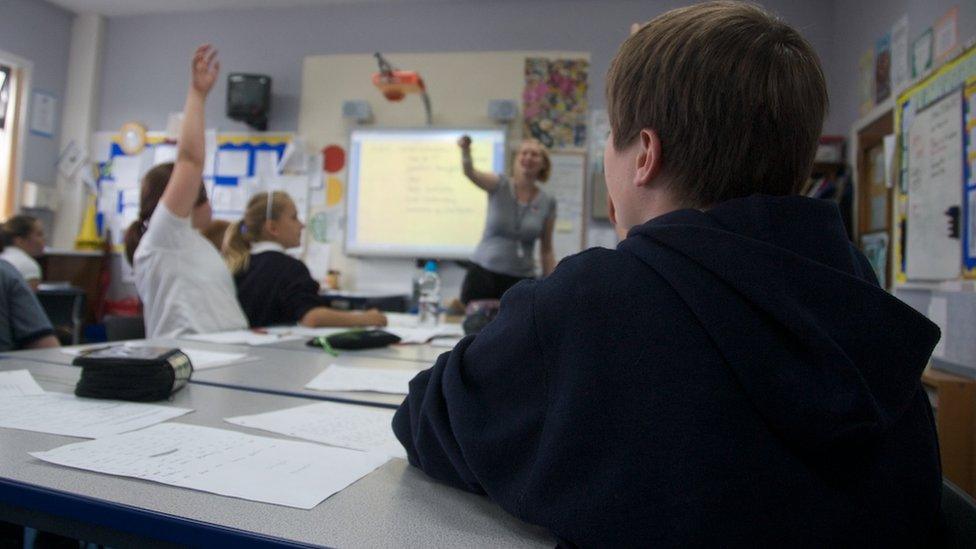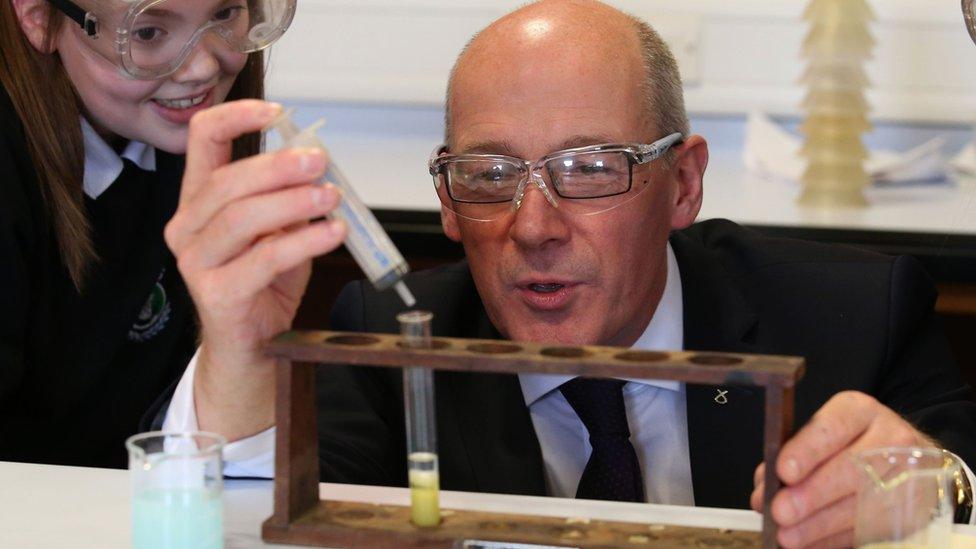EIS teaching union warns over new fast-track teacher plan
- Published
John Swinney: "We are announcing 11 different measures to encourage more people to come into the teaching profession."
Scotland's biggest teaching union has voiced concern over a proposal to fast-track new teachers into classrooms.
Education Secretary John Swinney has made public his "innovative plan" to "broaden" routes into teaching.
The Educational Institute of Scotland (EIS) said there was "much to welcome" in the raft of measures which include enticing former teachers to return.
However, it was unhappy at the idea of combining post-graduate learning with the one-year classroom probation.
Mr Swinney believed this particular measure would help to find the right people to teach Science, Technology, Engineering and Maths (STEM) subjects.
The Scottish government's Attainment Scotland Fund will pay for the package of proposals, at a cost of £1m.
Mr Swinney, who announced the details at the University of Dundee, said: "Teachers are the bedrock of Scotland's education system and I want to ensure we do everything we can to attract talented graduates to a career in teaching.
"The quality of teaching is key to helping pupils achieve and to our aspiration of closing the attainment gap.
"These innovative proposals are designed to do just that while, crucially, maintaining the traditionally high standard of teaching in Scotland."
'Highest standards'
Mr Swinney is aiming to recruit 200 new teachers into the profession.
General Secretary of the EIS, Larry Flanagan, said his union was behind the teacher recruitment drive but he warned against "short-cuts" which might undermine the "high standards of Scotland's teaching profession".
He believed the current arrangement whereby post-graduate training is followed by an induction period of a year in the classroom was the right one.
Mr Flanagan said: "A key strength of the Scottish system is an all-graduate teaching profession, coupled with a guaranteed induction year in a school to provide all new teachers with practical experience to complement their theoretical study.
"Our consistent view is that one-year of postgraduate training followed by a one-year induction period is the minimum period for any individual to become fully comfortable with both teaching theory and its practical application.
"To suggest moving to a shortened fast-tracking route is inconsistent with the need to maintain and enhance the highest standards."

Mr Swinney said teachers were the bedrock of Scotland's education system
General secretary of the Scottish Secondary Teachers' Association (SSTA), Seamus Searson, said his biggest concern was keeping current teachers in the profession.
He added: "We cannot rely just on recruiting teachers and not address the issues of teachers pay, career structure and workload.
"It is important that we focus on all the aspects and not just turn on the tap of recruitment when the plug of retention has not been fixed in the bath."
However, the General Teaching Council Scotland - which controls entry into the profession - said it was confident the changes would not lead to a fall in standards.
Its chief executive, Ken Muir, said: "Flexibility is crucial when trying to attract new people into the teaching profession and to address the issue of teacher shortages. GTC Scotland is at the forefront in promoting a wide range of new and innovative routes into teaching for those wishing to join the profession in Scotland."
What are political parties saying?
Responding to Mr Swinney's recruitment proposals, Scottish Labour's education spokesman Iain Gray MSP said that "whatever the merit", £1m was not going to solve "our teacher recruitment crisis".
He added: "The SNP has cut over 4,000 teachers from our schools, and axed hundreds of millions of pounds from the council budgets which fund them."
Ross Greer of the Scottish Greens said recruiting more teachers was "essential", but taking on 200 new teachers fell short of what was needed.
He added: "Investing just 0.13% of the £750m Attainment Fund suggests Scottish ministers haven't yet grasped how important it is to give teachers more time to teach."

What are the proposals?
Council workers becoming primary teachers
expand to all authorities Aberdeen's distant learning programme for local authority staff becoming qualified primary teachers (University of Aberdeen)
expand Dundee's "Learn to Teach" programme to include secondary teacher education, and make it available to all local authorities (University of Dundee )
Former teachers
develop and expand courses that help prepare qualified teachers who have been out of teaching for a while, or who have never taught in Scotland, for the classroom (University of Edinburgh)
Newly-qualified teachers from Ireland
recruit recently qualified teachers from Ireland, such as those with STEM subjects, to undertake further study while they work in a partner local authority (University of Glasgow)
Primary specialism
produce qualified primary teachers with additional subject specialisms including literacy, numeracy, additional support needs and STEM subjects (University of Stirling)
produce qualified teachers to work between P6 and S3 in Mathematics (University of Glasgow)
Science, Technology, Engineering and Maths (STEM) subjects
fast track training that combines post-graduate education with the probation year focusing on STEM graduates (University of Dundee)
STEM graduates would complete a Postgraduate Diploma in Education (PGDE) and achieve the Standard for Full Registration alongside a Masters degree (University of Strathclyde)
Home Economics
Non-traditional entrants to be supported through new undergraduate courses (Perth College UHI and University of the Highlands and Islands UHI)
Joint degrees with a secondary specialism
adding technology to shared concurrent degrees for physics and chemistry (University of Stirling and Heriot Watt)
University of the West of Scotland - extending concurrent degree programme to include physics and chemistry (University of the West of Scotland)
- Published15 June 2016

- Published11 June 2016
